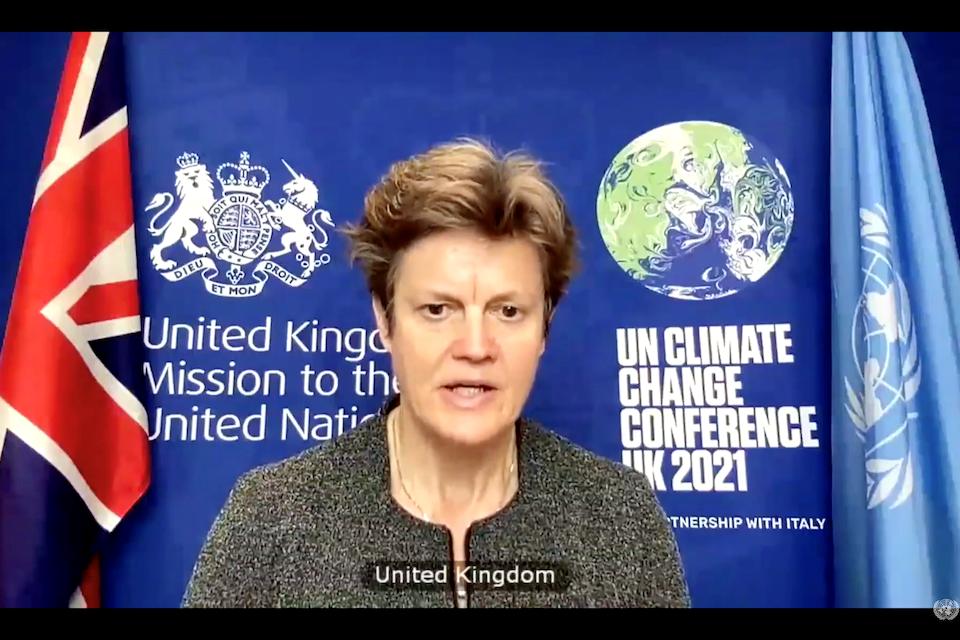Reiterating the UK's full support for the Secretary-General’s call for a global ceasefire
Statement by UK Ambassador Barbara Woodward at Security Council briefing on resolution 2532 on Covid-19

Thank you, Mr. President. May I start by thanking you for calling this debate. The United Kingdom reiterates its full support for the Secretary-General’s call for a global ceasefire and the implementation of the commitments under resolution 2532.
Sadly, as we’ve heard, despite a global pandemic of historic proportions, peacebuilding has not always been afforded the priority it deserves. There has indeed been some progress, but implementation of the resolution continues to be mixed, as the following three examples illustrate.
In Yemen, as we’ve heard, the Houthis failed to reciprocate the Saudi-led coalition’s unilateral ceasefire offers in 2020, and the recent Houthi attack on Aden has gravely undercut peace efforts. Now is the time to rally round the UN Special Envoys efforts to secure a lasting political solution to the conflict. The stakes have never been higher and the humanitarian crisis, already the world’s worst, is significantly worsening with the effects of Covid-19. In September the Foreign Secretary warned that Yemen had never looked more likely to slide into famine. According to the latest Integrated Food Security Phase Classification data, published in 2020, 16,500 Yemenis were living in famine conditions, now set to almost triple to forty seven thousand by June 2021.
Second, in South-Sudan, sustained increases in violence throughout 2020, combined with record flooding, mean areas of the country now likely face famine or famine-like conditions. This is a catastrophe that the government of South-Sudan must urgently address with international support. The 2018 peace deal remains the best chance of an end to violence and longer-term stability. However, implementation has stagnated. As such, greater coordinated international and regional pressure is needed on the government of South-Sudan to ensure they deliver their commitments.
More encouragingly, we welcome the signing of the Juba Peace Agreement on the 3rd of October 2020 by the government of Sudan, the Sudan Revolutionary Front and Sudan Liberation Movement, Minni Minawi. This is a crucial step towards comprehensive peace. But despite this progress, significant challenges remain here too, including intercommunal violence. The violence that occurred recently in West and South Darfur highlights the continued need for protection of civilians, which full implementation of the Juba Peace Agreement could help provide for. We encourage the signatories of the agreement to begin swiftly the process of implementation, particularly those provisions of the agreement pertaining to security arrangements and addressing the root causes of conflict. We also urge all those who remain outside the peace negotiations to engage immediately and constructively without preconditions.
As we’ve heard throughout 2020, we sadly saw the voices of women sidelined in peace processes. This is a grave problem, not just morally, but also because peace is more sustainable when it meets and reflects the needs of all people, men and women. The UK strongly urges the full, equal and meaningful participation of women and of youth, religious groups and NGOs in peacebuilding. And we must ensure women are able to carry out their work free from threats and violence. No woman should have to risk her safety to heal her community.
Finally, as we know, the Covid-19 pandemic threatens international peace and security. Ending the pandemic requires equitable global access to vaccines. Yet there are particular barriers to vaccine delivery in contexts affected by conflict and insecurity. We welcome the initiative of the Tunisian presidency to do more at this critical time. And building on resolution 2532 the United Kingdom will convene a meeting in our presidency next month to address potential barriers to vaccine access such as ceasefires, logistics and funding for delivery. Thank you, Mr President.